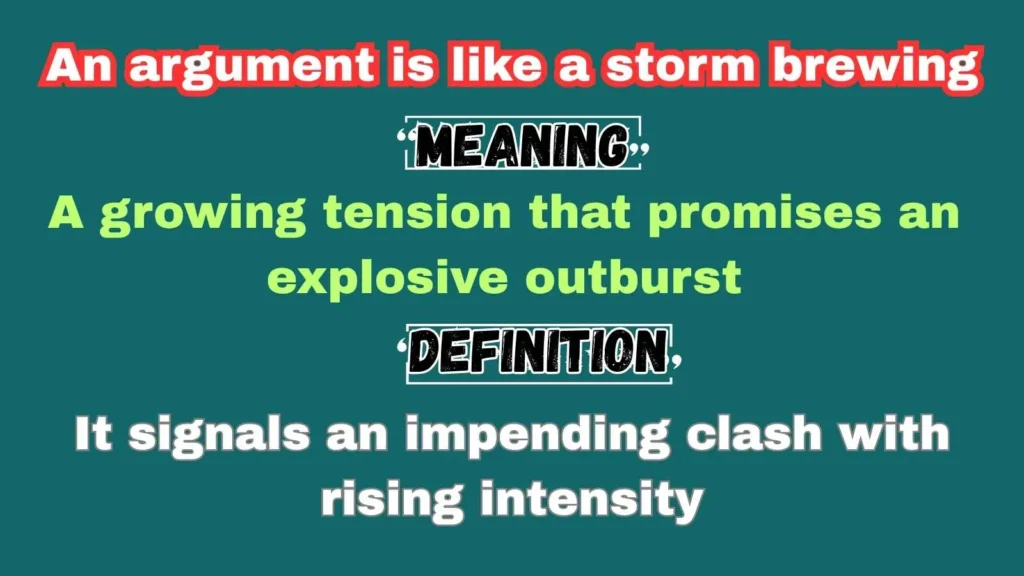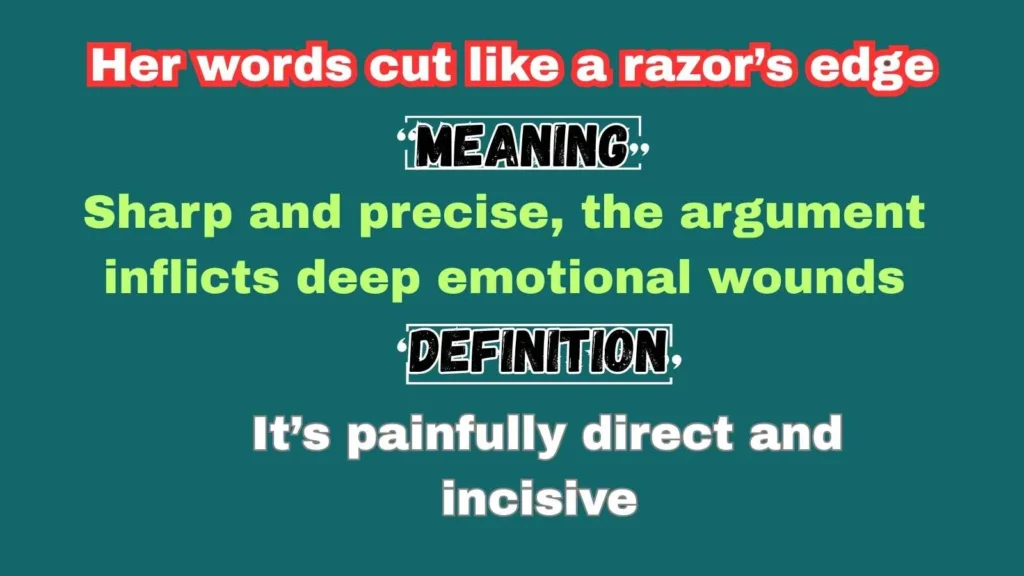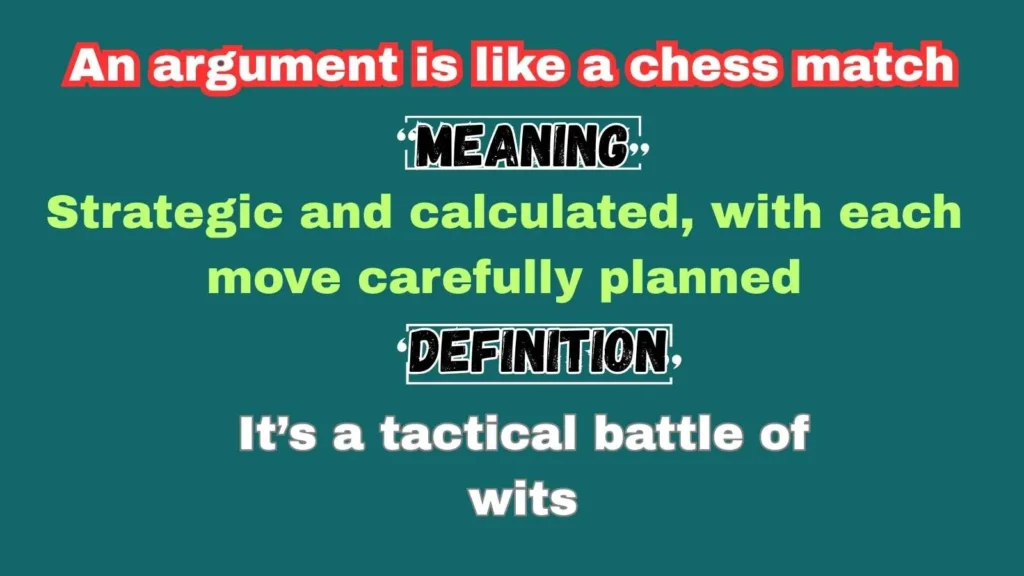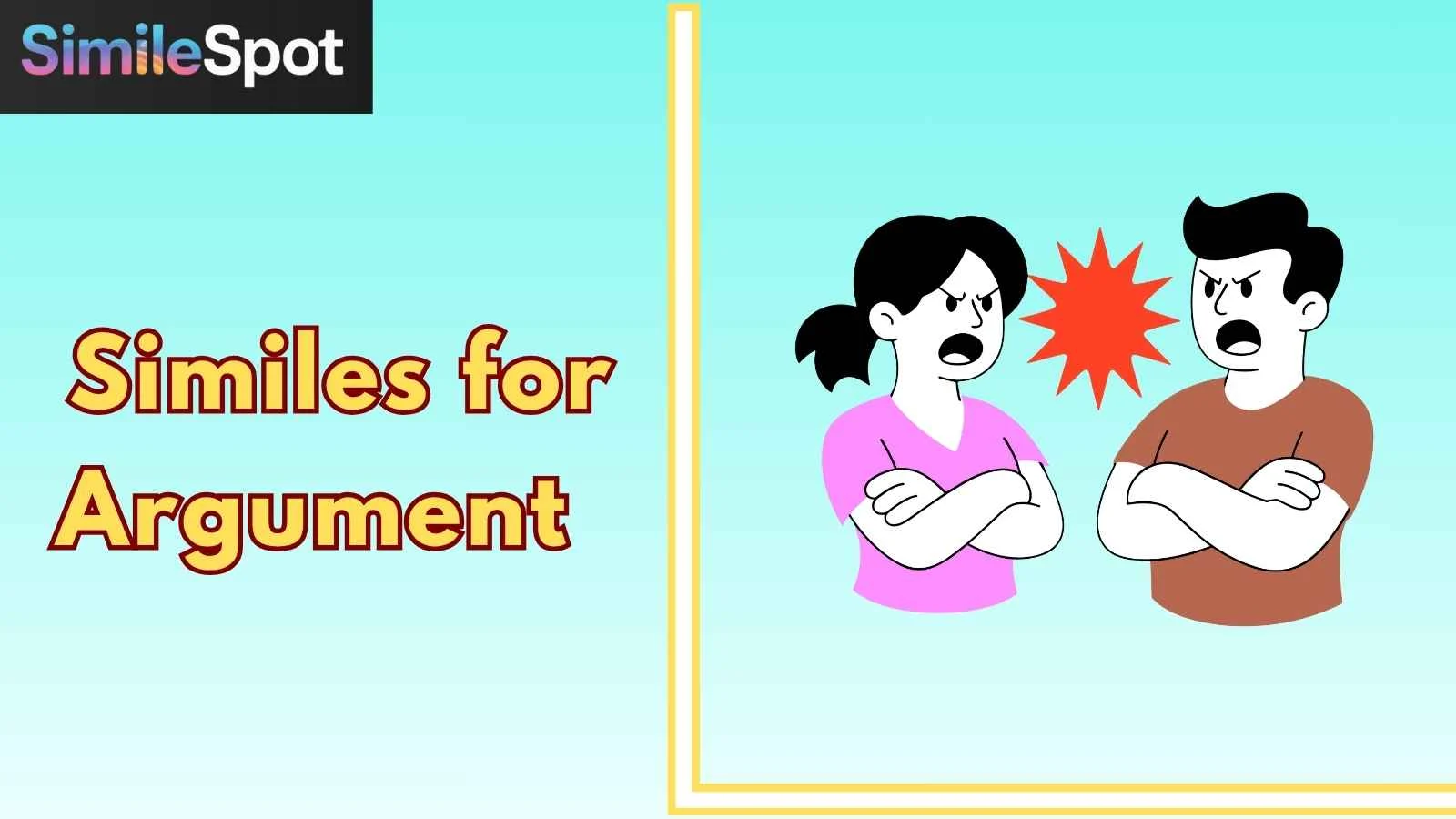imiles bring arguments to life, painting vivid pictures with words by comparing one thing to another using “like” or “as.” They make debates, discussions, and writing more engaging, transforming dry points into memorable moments.
Whether you’re a writer, student, or speaker, similes can add flair and clarity to your arguments. This article unveils a treasure trove of similes that capture the essence of arguing, inspiring you to weave them into your work.
Read on to discover creative comparisons that will sharpen your expression and captivate your audience!
What Exactly Is a Simile?
A simile is a figure of speech that compares two different things using “like” or “as” to highlight a shared quality. In the context of arguments, similes vividly illustrate the tone, impact, or dynamics of a debate. They make complex emotions or situations relatable and engaging.
5 Quick Similes for Argument
| Simile | Meaning | Example Sentence |
|---|---|---|
| An argument is like a storm brewing. | Tension builds rapidly, leading to an explosive clash. | Their disagreement was like a storm brewing, ready to erupt at any moment. |
| Arguing is as futile as wrestling a pig in mud. | It’s messy and exhausting with no clear winner. | Debating with him felt as futile as wrestling a pig in mud—nobody wins, but everyone’s dirty. |
| Their argument flared like a wildfire. | It spreads quickly and uncontrollably. | The debate flared like a wildfire, consuming everyone in the room. |
| An argument is like a tug-of-war. | Both sides pull hard, refusing to yield. | Their heated exchange was like a tug-of-war, each side digging in their heels. |
| It’s as sharp as a razor’s edge. | The argument is cutting and precise. | Her words were as sharp as a razor’s edge, slicing through his defenses. |
An argument is like a storm brewing.

Meaning: A growing tension that promises an explosive outburst.
One-line definition: It signals an impending clash with rising intensity.
Example Sentence 1: Their quiet disagreement was like a storm brewing, ready to unleash its fury.
Example Sentence 2: You could feel the argument coming, like a storm brewing on a humid summer day.
Arguing feels like wrestling a pig in mud.
Meaning: A messy, exhausting struggle with no clear victory.
One-line definition: It’s a chaotic and fruitless battle.
Example Sentence 1: Trying to reason with her was like wrestling a pig in mud—pointless and draining.
Example Sentence 2: Their debate felt like wrestling a pig in mud, leaving both sides frustrated.
Their dispute flared like a wildfire.
Meaning: An argument that escalates rapidly and engulfs everything.
One-line definition: It spreads fast and uncontrollably.
Example Sentence 1: What started as a small disagreement flared like a wildfire, pulling everyone in.
Example Sentence 2: The argument flared like a wildfire, burning through their patience in seconds.
A heated argument is like a tug-of-war.
Meaning: Both sides pull relentlessly, unwilling to concede.
One-line definition: It’s a relentless struggle for dominance.
Example Sentence 1: Their shouting match was like a tug-of-war, neither willing to let go.
Example Sentence 2: The debate felt like a tug-of-war, with both sides fiercely holding their ground.
Her words cut like a razor’s edge.

Meaning: Sharp and precise, the argument inflicts deep emotional wounds.
One-line definition: It’s painfully direct and incisive.
Example Sentence 1: Her argument cut like a razor’s edge, leaving him speechless.
Example Sentence 2: The criticism was like a razor’s edge, sharp and unforgettable.
Bickering is like a dripping faucet.
Meaning: Small but persistent, it wears you down over time.
One-line definition: It’s an irritating, ongoing nuisance.
Example Sentence 1: Their constant bickering was like a dripping faucet, impossible to ignore.
Example Sentence 2: The argument dripped like a faucet, slowly driving everyone wild.
Their clash was like a volcano erupting.
Meaning: A sudden, explosive release of pent-up emotions.
One-line definition: It’s a dramatic and fiery outburst.
Example Sentence 1: The room shook as their argument erupted like a volcano.
Example Sentence 2: Their clash was like a volcano erupting, impossible to contain.
Debating him is like banging your head against a wall.
Meaning: A frustrating, unproductive effort.
One-line definition: It’s stubbornly futile.
Example Sentence 1: Arguing with him was like banging my head against a wall—nothing changed.
Example Sentence 2: The debate felt like banging your head against a wall, pointless and painful.
An argument is like a chess match.

Meaning: Strategic and calculated, with each move carefully planned.
One-line definition: It’s a tactical battle of wits.
Example Sentence 1: Their argument unfolded like a chess match, each anticipating the other’s move.
Example Sentence 2: The debate was like a chess match, with every word strategically placed.
Their spat was like a tangled knot.
Meaning: Complex and difficult to unravel.
One-line definition: It’s a complicated mess of emotions.
Example Sentence 1: Their argument was like a tangled knot, impossible to resolve quickly.
Example Sentence 2: The spat grew like a tangled knot, with no clear way to untie it.
Arguing is like dancing on hot coals.
Meaning: Tense and uncomfortable, requiring quick thinking.
One-line definition: It’s a painful, high-stakes exchange.
Example Sentence 1: Debating her felt like dancing on hot coals—every step was agonizing.
Example Sentence 2: Their argument was like dancing on hot coals, forcing quick responses.
Their quarrel was like a river rapids.
Meaning: Fast-moving and hard to navigate.
One-line definition: It’s a turbulent, rushing conflict.
Example Sentence 1: The argument surged like a river rapids, pulling them along.
Example Sentence 2: Their quarrel was like a river rapids, wild and unpredictable.
Disputing is like a boxing match.
Meaning: A direct, combative exchange of blows.
One-line definition: It’s a head-to-head verbal fight.
Example Sentence 1: Their argument was like a boxing match, each landing heavy blows.
Example Sentence 2: The debate felt like a boxing match, with sharp jabs and quick dodges.
An argument is like a runaway train.
Meaning: Unstoppable once it gains momentum.
One-line definition: It’s an out-of-control clash.
Example Sentence 1: Their disagreement roared like a runaway train, impossible to stop.
Example Sentence 2: The argument sped like a runaway train, crashing through reason.
Their bickering was like a swarm of bees.
Meaning: Relentless and stinging from all directions.
One-line definition: It’s a barrage of sharp retorts.
Example Sentence 1: Their argument buzzed like a swarm of bees, overwhelming and chaotic.
Example Sentence 2: The bickering stung like a swarm of bees, leaving everyone irritated.
Arguing feels like climbing a steep hill.
Meaning: Exhausting and seemingly endless.
One-line definition: It’s a grueling, uphill battle.
Example Sentence 1: Debating him was like climbing a steep hill—tiring and relentless.
Example Sentence 2: Their argument felt like climbing a steep hill, with no end in sight.
Their dispute was like a cracked mirror.
Meaning: Broken and distorted, reflecting fractured truths.
One-line definition: It’s a fragmented, flawed exchange.
Example Sentence 1: The argument was like a cracked mirror, distorting their intentions.
Example Sentence 2: Their dispute reflected like a cracked mirror, showing only pieces of the truth.
Bickering is like a dog chasing its tail.
Meaning: Pointless and circular, going nowhere.
One-line definition: It’s a repetitive, futile cycle.
Example Sentence 1: Their argument was like a dog chasing its tail, endlessly circling.
Example Sentence 2: The bickering spun like a dog chasing its tail, achieving nothing.
An argument is like a pressure cooker.
Meaning: Intense and ready to explode under pressure.
One-line definition: It’s a tense, volatile clash.
Example Sentence 1: Their disagreement simmered like a pressure cooker, ready to burst.
Example Sentence 2: The argument built up like a pressure cooker, waiting to explode.
Their clash was like a thunderstorm.
Meaning: Loud, dramatic, and electrifying.
One-line definition: It’s a booming, intense conflict.
Example Sentence 1: The room shook as their argument roared like a thunderstorm.
Example Sentence 2: Their clash was like a thunderstorm, striking with sudden force.
Debating is like navigating a minefield.
Meaning: Dangerous and unpredictable, with risks at every step.
One-line definition: It’s a perilous verbal battle.
Example Sentence 1: Arguing with her was like navigating a minefield—one wrong move could end it.
Example Sentence 2: The debate felt like navigating a minefield, full of hidden dangers.
Their spat was like a house of cards.
Meaning: Fragile and ready to collapse under pressure.
One-line definition: It’s a delicate, unstable argument.
Example Sentence 1: Their argument teetered like a house of cards, ready to fall apart.
Example Sentence 2: The spat was like a house of cards, crumbling with one sharp word.
Arguing is like stirring a hornet’s nest.
Meaning: Provoking a swarm of angry responses.
One-line definition: It’s a reckless, chaotic provocation.
Example Sentence 1: Bringing up that topic was like stirring a hornet’s nest—everyone got stung.
Example Sentence 2: Their argument erupted like stirring a hornet’s nest, full of fury.
Their quarrel was like a tightrope walk.
Meaning: Precarious and requiring careful balance.
One-line definition: It’s a delicate, high-risk exchange.
Example Sentence 1: The debate felt like a tightrope walk, one misstep away from disaster.
Example Sentence 2: Their quarrel was like a tightrope walk, teetering on the edge of collapse.
Disputing is like a game of poker.
Meaning: Strategic, with hidden intentions and high stakes.
One-line definition: It’s a calculated, bluff-filled battle.
Example Sentence 1: Their argument unfolded like a game of poker, each hiding their true feelings.
Example Sentence 2: The debate was like a game of poker, with bold moves and clever bluffs.
An argument is like a raging river.
Meaning: Powerful and difficult to control.
One-line definition: It’s an overwhelming, forceful clash.
Example Sentence 1: Their disagreement flowed like a raging river, sweeping everyone away.
Example Sentence 2: The argument roared like a raging river, unstoppable and fierce.
Their bickering was like a broken record.
Meaning: Repetitive and stuck on the same points.
One-line definition: It’s a monotonous, looping dispute.
Example Sentence 1: Their argument played like a broken record, repeating the same complaints.
Example Sentence 2: The bickering was like a broken record, stuck on endless grievances.
Arguing feels like walking through a fog.
Meaning: Confusing and disorienting, with no clear path.
One-line definition: It’s a murky, unclear conflict.
Example Sentence 1: Debating him was like walking through a fog—nothing was clear.
Example Sentence 2: Their argument felt like walking through a fog, lost in confusion.
Their dispute was like a ticking time bomb.
Meaning: Building tension until an inevitable explosion.
One-line definition: It’s a volatile, imminent clash.
Example Sentence 1: The argument sat like a ticking time bomb, ready to detonate.
Example Sentence 2: Their dispute was like a ticking time bomb, waiting to erupt.
Bickering is like a cat-and-mouse game.
Meaning: A playful yet intense back-and-forth chase.
One-line definition: It’s a cunning, evasive exchange.
Example Sentence 1: Their argument danced like a cat-and-mouse game, dodging and pouncing.
Example Sentence 2: The bickering was like a cat-and-mouse game, teasing and relentless.
Crafting Vivid Arguments with Similes
Similes can elevate your creative writing, turning ordinary arguments into memorable scenes. Here’s how to weave them into various forms of expression:
- Poetry: Use similes to evoke emotion and rhythm. For example, “Our words clashed like a thunderstorm” adds intensity to a poem about conflict, creating a vivid emotional landscape.
- Stories: In narratives, similes like “Their spat was like a house of cards” can describe character dynamics, making dialogues feel alive and relatable.
- Songs: Song lyrics thrive on imagery. A line like “Arguing with you is like wrestling a pig in mud” can add humor and relatability to a verse.
- Essays: In persuasive writing, similes like “The debate flared like a wildfire” can make arguments more engaging, drawing readers into your point of view.
Tips for Effective Use:
- Match the tone: Choose similes that align with the mood—lighthearted for humor, intense for drama.
- Be concise: Keep similes short and impactful to maintain flow.
- Avoid overuse: Sprinkle similes sparingly to avoid overwhelming the reader.
- Test for clarity: Ensure the comparison is relatable and enhances understanding.
By thoughtfully integrating similes, you can transform arguments into captivating moments that linger in the reader’s mind.
FAQs
### What is a simile in simple terms?
A simile compares two things using “like” or “as” to highlight a shared quality, making descriptions more vivid.
### Why use similes for arguments?
Similes make arguments more relatable and engaging, turning abstract emotions into concrete, memorable images.
### How can similes improve my writing?
They add color, clarity, and emotional depth, making your writing more impactful and easier to visualize.
### Can similes be used in formal writing?
Yes, when used sparingly, similes can enhance formal writing by clarifying complex ideas with relatable comparisons.
### How do I create my own similes?
Think of a vivid image that shares a quality with your subject, then connect them with “like” or “as” for a clear comparison.
Wrapping Up the Art of Argument Similes
Similes bring arguments to life, turning heated exchanges into vivid, relatable moments. By weaving these creative comparisons into your writing, you can captivate readers and make your words unforgettable.
Whether you’re crafting poems, stories, or essays, these expressive phrases add depth and emotion. Embrace the power of similes to transform your arguments into compelling narratives that resonate long after the page is turned.

